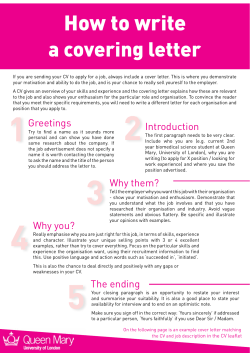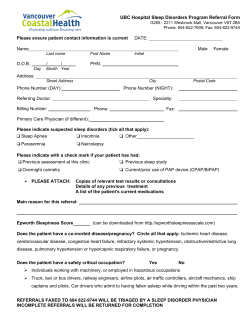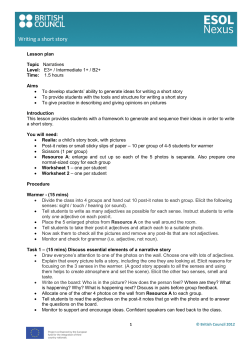
S1
positive mental attitudes curriculum S1 Page Content Link to Glasgow’s Health Lessons 1 and 2 together Cover Theme: All About Me Topic: Myself Unit: Personal Health Support Theme: My Relationships Topic: Me Unit: Personal Profile Lesson 1 5 What is mental health? Pupils will understand the concept of mental health Pupils will have a working definition of a mentally healthy young person Lesson 2 9 Myths surrounding mental health Pupils will have increased awareness about commonly held myths regarding mental health and have an understanding of factual information Lesson 3 17 Friendships Covers Pupils will develop an increased understanding Theme: My Relationships of friendships and how they can support good Topic: My Friends mental health Unit: Beginning New Friendships Supports Theme: Keeping Me Safe Topic: My Decisions Peer Pressure Unit: Lesson 4 21 Sleep and relaxation Covers Pupils will understand the role of sleep and rest Theme: Keeping Me Safe in maintaining good health Topic: Keeping Well Rest and Sleep Unit: 4 positive mental attitudes curriculum S1 Lesson 1 – What is mental health? Materials Pupil Worksheet 1.1: one per each small group Paper and pens one per each pair Learning Outcome Pupils will be aware of the concept of mental health Pupils will have a working definition of a mentally healthy young person Activity 1 15 mins Pupils in pairs Teacher S1 lesson 1 and S1 Lesson 2 together: Cover Theme: All About Me Topic: Myself Unit: Personal Health Support Theme: My Relationships Topic: Me Unit: Personal Profile Think of someone that you would describe as really healthy. Write down a list of words that describe what this person is like. Draw a table with three headings: Mental Health, Physical Health and Social Health. Put the words from pupils’ lists under the appropriate heading- see Teachers’ Notes 1.1 Activity 1 Activity 2 10 mins Pupils in small groups Teacher Create a definition of a mentally healthy young person. Take feedback and agree a definition of a mentally healthy young person, using Teachers’ Notes 1.1 Activity 2 Activity 3 25 mins Pupils in small groups Complete Pupil Worksheet 1.1 Activity 3 Things which affect my mental health Take feedback and discuss where you could go for help if you had a mental health problem, using Teachers’ Notes 1.1 Activity 3 Teacher 5 positive mental attitudes curriculum Teachers’ Notes 1.1 Activity 1 & 2 Activity 1 Mental Health Physical Health Social Health Enjoys life Feeling fit Looking forward to the future Energetic Good relationships - family, friends and community Feels valued Optimistic Free from pain and disease Sense of achievement Enough to eat Happy Good sleep Feels able to make an impact on the world Feels able to be creative and expressive Able to learn, work and succeed Able to deal with crises Sense of fun Ability to laugh at self Activity 2 The concept of health encompasses both physical and mental health in equal measures. Health has personal, social, political and moral aspects. A mentally healthy young person is one who has the ability to: Develop psychologically, emotionally, socially, intellectually, and spiritually Initiate, develop and sustain mutually satisfying relationships Use and enjoy solitude Become aware of others and empathise with them Play and learn Develop a sense of right and wrong Resolve (face) problems and setbacks satisfactorily and learn from them. Bright Futures: Promoting children and young people’s mental health, published by the Mental Health Foundation. 6 positive mental attitudes curriculum Pupil Worksheet 1.1 Activity 3 Things that affect my mental health Things that affect my mental health negatively (make me less happy) Things that affect my mental health positively (make me happier) 7 positive mental attitudes curriculum Teachers’ Notes 1.1 Activity 3 Things that affect my mental health Possible answers from pupils Things that affect my mental health positively Things that affect my mental health negatively (make me happier) (make me less happy) Feeling healthy Having friends Doing well at school Going on holiday Thinking positive thoughts “ I can do this” “I am a good person” Bullying Arguments at home Not having enough money Falling out with friends Thinking negative thoughts “I can’t do this” “Bad things always happen to me” How can you help yourself? Simple tips: Write a list of things you like about yourself and things you are proud of achieving Write a list of some of the difficult things you have coped with in the past If you like you can ask someone to help you Look after yourself, get enough sleep, eat well and exercise Reward yourself when something goes well Forgive yourself when you get things wrong and learn something from it Make time for doing the things you enjoy, even if you don’t feel like doing them Where could you go for help? • Within school: trusted teacher, pastoral care teacher, school nurse, friends, other members of school community • Outwith school: friends, relative, local youth health service, GP, private counsellor or therapist, youth worker • Schools and GPs may then refer to Child and Adolescent Mental Health Team for more structured/medical support • Emergency support: NHS 24, hospital accident and emergency department, out of hours social work services When to tell others If a young person is concerned that a friend/peer is at risk from suicide or abuse or is considering running away from home, they should consider supporting the person to talk to someone quickly or they should pass that information to one of the people listed above. 8 positive mental attitudes curriculum S1 Lesson 2 – Myths surrounding mental health Materials Pupil Worksheet Activity 1: one per small group Pupil Worksheet Activity 2: one per small group Pupil Worksheet Activity 3: one per small group Learning Outcome Pupils will have increased awareness about commonly held misconceptions about young people and how people with mental health problems experience similar demonisation Introduction 5 mins Activity 1 15 mins Introduction Teacher Pupils in small groups Teacher Activity 2 15 mins Pupils in small groups Teacher Activity 3 10 mins Pupils in small groups Teacher Activity 4 5 mins Pupils in small groups S1 lesson 1 and S1 Lesson 2 together: Cover Theme: All About Me Topic: Myself Unit: Personal Health Support Theme: My Relationships Topic: Me Unit: Personal Profile Discuss with class: How does society view young people? How are they represented, as a group, by newspapers? Use Teachers’ Notes 1.2 Introduction Complete Pupil Worksheet 1.2 Activity 1 Tabloid perspective of a young person Take feedback using Teachers’ Notes 1.2 Activity 1 Complete Pupil Worksheet 1.2 Activity 2 Horror film perspective of a person with mental health problems Take feedback and lead discussion using Teachers’ Notes 1.2 Activity 2 Complete Pupil Worksheet 1.2 Activity 3 Mental Health Quiz Take answers and lead discussion, using Teachers’ Notes 1.2. Activity 3 Revisit Pupil Worksheets 1.2 Activity 1 and 2 and ask class: How accurate are they? Discuss using Teachers’ Notes 1.2 Activity 4 9 positive mental attitudes curriculum Teachers’ Notes 1.2 Introduction Teenagers targeted in drive against yob culture Imps of Satan Boys, 10 and 11, on curfew for terrorising neighbours CURFEW TOWN Teenage yobs banned at night THE BLIGHT IN BRITAIN SHAME A YOB 71 % of press stories about young people are negative 33% of articles about young people concern crime Only 8% of stories about young people contain quotes from young people Reproduced with kind permission from Young People Now magazine Young People Now Cover Story October 2004 The majority of crime is not committed by young people. In 2000, 88% of detected crime was committed by over 18s, and most of those were over 21s. Centre for Crime and Justice Studies of King's College London www.crimeinfo.org.uk • Young people are often treated as one demographic group and not as individuals. • They are frequently assumed to be responsible for crime, vandalism and anti-social behaviour. • Young people in large groups are perceived by members of the public to be threatening. • The language commonly used to describe young people can be derogatory, with words such as “yobs”, “neds”, “thugs” and “hooligans” being used by the tabloid press in stories concerning young people. • Young people regularly encounter discrimination from the public, in the street, on public transport, in shops, in leisure facilities and even within families. • Young people are usually aware of the negative perceptions members of the public have of them and the subsequent discrimination they face. 10 positive mental attitudes curriculum Pupil Worksheet 1.2 Activity 1 Tabloid Perspective of a Young Person Describe how young people are portrayed in the media 11 positive mental attitudes curriculum Pupil Worksheet 1.2 Activity 2 Horror Film Perspective of a Person with Mental Health Problems Describe how people with mental health problems are portrayed in films 12 positive mental attitudes curriculum Teachers’ Notes 1.2 Activity 1 & 2 Activity 1 Activity 2 Tabloid Perspective of a Young Person Possible answers from pupils Horror Film Perspective of a Person with Mental Health Problems Possible answers from pupils • Wears a hoodie • Unemployed/Skips school • Wears a strait jacket • Hangs around streets • Unwashed • Abusive/Swears • Violent/murders People • Violent • Messy/dirty appearance • Gang member • Lives in “loony bin” • Drinks alcohol • Danger to society • Shoplifts • Not intelligent • Vandalises • Can’t communicate • Lazy • Can’t be cured • Low intelligence • Doesn’t understand what’s going on • Mugs people • Criminal • Disrespectful • Evil What effect do these films have? Despite knowing that these films are fiction, they often provide the basis for our beliefs about mental health problems. Feelings still prevail that people with mental health problems are violent, should be locked up, that they have lower intelligence, are criminal, are in some way responsible for their problems and they can be identified “by the way they look.” Exposure to mental health problems, our own or a family member’s or friend’s, often destroys these powerful myths. 13 positive mental attitudes curriculum Pupil Worksheet 1.2 Activity 3 Mental Health Quiz True or false statements (please circle) 1. Only certain kinds of people develop mental health problems True/False 2. There are many different types of mental health problems True/False 3. Most people who have mental health problems end up in hospital True/False 4. If you think you have a mental health problem you should talk to someone about it True/False 5. People are born with mental health problems True/False 6. You can tell someone has a mental health problem by looking at them True/False 7. You cannot recover from mental health problems True/False 8. People with mental health problems are likely to be violent True/False 14 positive mental attitudes curriculum Teachers’ Notes 1.2 Activity 3 Mental Health Quiz 1. Only certain kinds of people develop mental health problems: False ANYONE can develop a mental health problem. 2. There are many different types of mental health problems: True In the course of a year, 1 in 4 people will suffer some kind of mental health problem. Many of these problems are mild and temporary and are often related to life circumstances (for children and young people they are often related to what is going on in families and at school). These problems are manageable with help from friends, parents and teachers, and they pass as people move on and find new solutions. However others are more serious and can make people particularly anxious, frightened or angry, or feel undermined, discriminated against and isolated. 3. Most people who have a mental health problem end up in hospital: False Very few require treatment within a hospital. Research shows that in every 1000 of the population, 300 will experience symptoms that can be described as psychiatric symptoms, of these only 24 will be referred to a psychiatric outpatient department and only 6 will become a patient in a hospital. (Source: based on figures from Goldberg, D. & Huxley, P, 1992, Common mental disorders - a bio-social model, Routledge.) from www.mind.org.uk 4. If you think you have a mental health problem you should talk to someone about it: True Support is a positive factor in preventing mental health problems and promoting recovery. 5. People are born with mental health problems: False You cannot be born with a mental health problem. The belief that you can probably arises from confusion between mental health problems and some learning disabilities. 6. You can tell someone has a mental health problem by looking at them: False You cannot ‘see’ a mental health problem. NB. Often young people confuse physical disability with mental health problems. It needs to be made clear that those are not the same. Discuss: how are people with mental health problems portrayed in films and on TV? Is this where misconceptions come from? Cont. 15 positive mental attitudes curriculum Teachers’ Notes 1.2 Activity 3 continued & Activity 4 7. You cannot recover from a mental health problem: False The majority of people who experience a mental health problem do, with help, make a complete recovery. People with long term diagnoses such as schizophrenia and bi-polar disorder, also experience recovery. ….recovery is about much more than the absence of symptoms – it is about giving people the tools to become active participants in their own health care – it is about having a belief, drive and commitment to the principle that people can and do recover control in their lives, even where they may continue to live with ongoing symptoms. Scottish Recovery Network 2006 Discuss: what helps people recover from mental health problems? It is important to stress the roles of peers, family, relaxation, leisure time and being supported at school and at work. Talking is key to recovery from a mental health problem or management of one, whether to a counsellor or therapist or a friend, family member or Teacher. Although medication can play a significant role, it is social factors that promote and support recovery. 8. People with mental health problems are likely to be violent: False • The overwhelming majority of people with severe mental health problems experience symptoms which though distressing, do not make them violent or dangerous to the public. • Violence or violent conduct is not a symptom of any mental health problem. A very small minority of people with serious mental health problems are sometimes at risk of harming themselves or others. • Any potential risk can be minimised by early support and an individual, properly managed care plan that treats the patient as a person, capable of recovery. • The risk of being killed by a stranger with a severe mental health problem is roughly 1:10,000,000, about the same probability as being hit by lightning. source: see me Mental Health and Public Risk factsheet www.seemescotland.org Activity 4 Are these perspectives correct? No, they do not represent the overwhelming majority of young people or people with mental health problems. These perspectives are intended to sell newspapers and get people to watch films! 16 positive mental attitudes curriculum S1 Lesson 3 – Friendships Materials Pupil Worksheet 1.3 Activity 1: one per pupil Pupil Worksheet 1.3 Activity 2: one per pair Learning Outcome Pupils will develop an increased understanding of friendships and how they can support good mental health Introduction 10 mins Activity 1 10 mins Activity 2 5 mins Teacher Discuss with class why friends are important Pupils work on their own Complete Pupil Worksheet 1.3 Activity 1 Making new friends Teacher Take feedback Pupils in pairs Complete Pupil Worksheet 1.3 Activity 2 Advert for a good friend Take feedback Teacher Activity 3 25 mins Covers Theme: My Relationships Topic: My Friends Unit: Beginning New Friendships Supports Theme: Keeping Me Safe Topic: My Decisions Peer Pressure Unit: Teacher Lead class discussion on what causes friendships to end, using Teachers’ Notes 1.3 Activity 3 17 positive mental attitudes curriculum Pupil Worksheet 1.3 Activity 1 Making New Friends Friend: How I met them: What I liked about them: How we became friends: How we stay friends: Why this friendship is important: 18 positive mental attitudes curriculum Pupil Worksheet 1.3 Activity 2 FRIENDS.COM GLASGOW’S PREMIER FRIENDSHIP AGENCY Application Form Name: Requires Good Friend Must Have The Following Qualities In Return You Will Receive 19 positive mental attitudes curriculum Teachers’ Notes 1.3 Activity 3 What can cause friendships to end? Possible answers from pupils Falling out Person gets new friend and you are left out Breaking trust Pressure from other people not to hang about together Moving home/class/school People changing interest/hobbies/what they want out of life Friendships do naturally come to an end. It is important to remember that, like any loss, this can be difficult and painful and you may want to talk to someone about it. 20 positive mental attitudes curriculum S1 Lesson 4 – Sleep and relaxation Materials Covers Theme Keeping Me Safe Topic: Keeping Well Unit: Rest and Sleep Paper: one sheet per small group Pupil Worksheet 1.4 Activity 2: one per pair Learning Outcome Pupils will understand the role of sleep and relaxation in maintaining good health Introduction 10 mins Activity 1 20 mins Teacher Lead discussion on the difference between rest and sleep. Pupils in small groups Make a list of the reasons why we need rest and sleep. Make two lists of the effects of not getting enough sleep, short and long term. Take feedback lead using Teachers’ Notes 1.4 Activity 1 and lead discussion on activities which help us relax and reasons for relaxing. Discuss Top Tips for Good Sleep. Teacher Activity 2 10 mins Pupils in pairs Teacher Activity 3 10 mins Teacher Complete Pupil Relaxation Worksheet 1.4 Activity 2 Each pupil to ask their partner questions, noting answers on questionnaire and making recommendations. Take feedback on what the recommendations are and how they think they would affect them. Lead relaxation exercises Exercise 1: Breathe in to count of 6, breathe out for count of 6, pause for count of 2 and repeat. As you continue to breathe deeply, tense your toes for the inhale breath and relax on the exhale breath. Repeat for all areas of the body, working from toes to face and head. When you have completed this, continue to breathe deeply, enjoying the feeling of relaxation. Exercise 2: Bring your shoulders up to your ears, breathing in slowly. Allow your shoulders to drop as you breathe out, releasing all the tension. Repeat 5 times. 21 positive mental attitudes curriculum Teachers’ Notes 1.4 Activity 1 Rest and sleep are needed for Energy Ability to cope Ability to think clearly Staying healthy (mentally, physically and socially) Ability to get things done Staying cheerful Managing stress Consequences of not getting enough rest and sleep - short term No energy Can’t cope with everyday life or crises Muddled thoughts Unhealthy (mentally, physically and socially) Can’t get things done Bad mood, feeling anxious and irritable Feeling stressed Consequences of not getting enough rest and sleep - long term Schoolwork suffers Relationships suffer Feeling low Can develop mental health problems such as stress, anxiety or depression Prone to infections and in later life stress related conditions - high blood pressure, heart attacks and stroke Activities that help us relax Reading Watching TV/films Playing computer Having a bath Having a massage/hair cut Listening to music Playing an instrument Yoga/Tai Chi/Pilates etc Cont. 22 positive mental attitudes curriculum Teachers’ Notes 1.4 Activity 1 continued Reasons for relaxing Taking a break Winding down De-stressing/chilling out Taking time to be on your own Taking time to process thoughts e.g. at end of day Re-energising Giving your brain a break Top Tips for Good Sleep Exercise - during the day or early evening Eat well but not in the two hours before bed Drink less at night time Cut down on caffeine (in coffee, tea and some fizzy drinks) especially at night No smoking (nicotine is a stimulant and can keep you awake) No alcohol (people may think that a drink helps them sleep, it may help you get to sleep but it will wake you again in 2-4 hours) Routine - go to bed at the same time and get up at the same time, your body will soon learn when it’s meant to be sleeping If you are not asleep within 20 minutes or so, get back up and try again when you’re sleepy Relax - have a bath, read a book, listen to music, chill out Worry time - if you are worrying when you go to bed then try to set aside a different time to worry and tell yourself “I am not allowed to worry after 8pm. I’m going to get a good night’s sleep” Try to resolve arguments before going to bed 23 positive mental attitudes curriculum Pupil Worksheet 1.4 Activity 2 Relaxation Questionnaire Ask your partner… 1. Do you sleep well? Please tick Always n Most times n Sometimes n Hardly ever n 2. How many hours do you spend asleep/in bed? Weekdays ___________hrs Weekends ___________hrs 3. How do you relax? 4. How many hours a week do you spend relaxing? 5. How stressed do you think you are? Please tick Not stressed n A little but I feel I can cope n Quite a lot n 6. How often do you feel unwell Please tick Often n Quite often n Rarely n Never n 7. Recommendations (what you think they should do)? 24 Very stressed n positive mental attitudes curriculum S2 Page Content Link to Glasgow’s Health Lesson 1 26 Exploring self-esteem 1: What is self-esteem? Pupils will develop an understanding of factors which affect our self-esteem and how our actions affect others’ self-esteem Lesson 2 31 Exploring self-esteem 2: How life effects our self-esteem Pupils will develop an understanding of how life events affect our self-esteem Pupils will develop an understanding of thoughts, feelings and behaviour associated with having high/low self-esteem Lesson 3 37 Lesson 4 43 Covers Theme: All About Me Topic: Myself Unit: Mental Health Covers Theme: All About Me Topic: Myself Unit: Mental Health Supports Theme: Keeping Me Safe Topic: Keeping Well Unit: The Effects of a Healthy Lifestyle Coping with stress Covers Pupils will develop an understanding of factors Theme: All About Me which cause stress and how to cope with it Topic: Keeping Fit Unit: Relaxation Equality Covers Pupils will develop an understanding of equality Theme: My Relationships and discrimination Topic: My Community Equal Opportunities Unit: 25 positive mental attitudes curriculum S2 Lesson 1 – Exploring self-esteem 1: What is self-esteem? Materials Covers Theme: All About Me Topic: Myself Unit: Mental Health Pupil Worksheet 2.1 Activity 1: one per pupil Paper: two sheets per small group Learning Outcome Pupils will have an understanding of factors that affect our selfesteem and how our actions affect others’ self-esteem Introduction 10 mins Introduction Teacher Discuss with class: What is self-esteem? Using Teachers’ Notes 2.1 Introduction Activity 1 10 mins Pupils work on their own Complete Pupil Worksheet 2.1 Activity 1 Things that make me feel good/bad about myself Teacher Take feedback and discuss; What role do our peers play in our self-esteem, using Teachers’ Notes 2.1 Activity 1 Activity 2 10 mins Pupils in small groups Teacher Activity 3 20 mins Pupils in small groups Teacher Make one list of actions that positively affect others’ self-esteem and one of actions which negatively affect others’ self-esteem. Take feedback and lead discussion using Teachers’ Notes 2.1 Activity 2 “The Avenue” is a new soap being written for television. Groups have to invent a character for this, who displays very high self-esteem. Draw or describe this character. What do they look like/wear/do/say? What might their storyline be? Put characters on wall and ask the class to have a look at each other’s work. How realistic is this character? Lead discussion using Teachers’ Notes 2.1 Activity 3 26
© Copyright 2025










